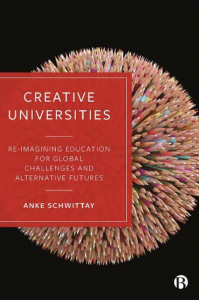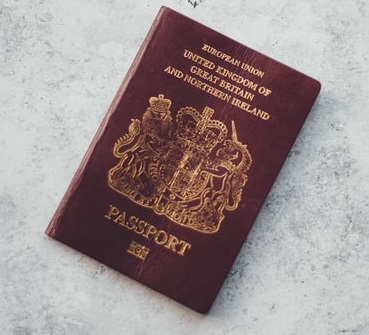In this excerpt from her book, Creative Universities – Reimagining Education for Global Challenges and Alternative Futures, Anke Schwittay introduces the case for a critical-creative education, which makes space for imagination, creativity, and radical hope.

A critical-creative education informed by radical creativity can better enable students to understand and address global challenges through imagining and working towards alternative futures. My language is deliberate – I am not proposing to solve current problems (although they undoubtedly need to be solved), because solutionism is too often associated with technological fixes, economic growth and scientific advances that need to be questioned rather than celebrated. Practices of working towards are gradual, modest, and meandering and therefore lend themselves to creative approaches. They also need to engage students’ imagination, because “we cannot build a future we cannot imagine” (Elgin, 1991, p. 5). Our imagination allows us to consider not just what is, but what can be, as it can broaden the scope of what is perceived as possible. However, there is always more than one possible future, and whose version of the future counts involves considerations of power and politics. A clearer understanding of the relationship between education and futuring can unpack universities’ roles in shaping diverse futures. Keri Facer shows that “futurity is embedded at the heart of the educational process” and has given rise to three main future orientations in education.
Future orientations in education
Firstly is “the future as a landscape for rational choice making,” where education contributes to rendering its contours knowable, identifying preferable actions, and assessing the impact of decisions. If Covid-19 has taught us anything, it is the fallacy of such instrumentalist assumptions. Second is a colonial orientation that aims to persuade students of particular visions of the future, be they progressive or conservative, and to shape their attitudes and behaviours towards these. While this is an enticing proposition, especially for critical educators, it needs to acknowledge its own ethical agendas, potential conflicts of interest, and possible temptation for adults to abdicate their responsibilities towards present challenges. This relates to the third orientation, where education serves as a bulwark against an unknown and potentially dystopian future, becoming the silver bullet that will solve all problems. These orientations not only overestimate the power of education and neglect the importance of other factors, but they also see educational success as the sole means of achieving personal and social goods. Too often, these future visions are dominated by prescriptive economic mandates and technological visions. By contrast, when futures are seen as sites of possibilities that students can explore, rather than being predetermined by teachers and other adults, educational spaces can become places of experimentation with potential alternative futures
.
when futures are seen as sites of possibilities that students can explore, rather than being predetermined by teachers and other adults, educational spaces can become places of experimentation with potential alternative futures.
Transition discourse
This raises the question of alternatives to what? Rather than simply meaning different or unusual, in this book, I propose radical alternatives to conventional, orthodox, hegemonic interventions. Each chapter begins with a decentering of mainstream perspectives and practices, to show that the alternatives I subsequently present are dissident, heterodox, unruly. At times I use these qualifiers, but even when I do not, the language of alternatives refers to multiple, diverse, and plural responses to contemporary challenges that differ from and often work against mainstream interventions. In conceptualising these alternatives, I draw especially on the work of Arturo Escobar, an anthropologist of (post)development who has turned his thinking towards pluriversal alternatives that are grounded in social movements in his native Columbia and other indigenous cosmovisions and that incorporate ideas of design, political ecology, feminist economics, and political ontology, among others. Many of these alternatives feed into the emerging field of transition studies, which bring together pure, applied, and engaged research on transformational actions by drawing on diverse academic disciplines as well as social movements, activist networks, and radical civil society organisations.
What unites these various fields are transition discourses that call for heterodox transformations, because contemporary crises cannot be solved from within the current epistemological, economic and political paradigms that have been instrumental in creating these crises. According to de Sousa Santos, “we have modern problems for which there are no modern solutions,” or, as Colombian activists put it, “we cannot construct our world with more of the same . . . What’s possible has already been done; now let’s go for the impossible.” This leads Escobar and others to argue that we “need to step outside of existing institutional and epistemic boundaries if we truly want to envision the worlds and practices capable of bringing about the significant transformations seen as needed.” It also implies moving away from a world view dominated by Euro-American history and thought that presents itself as universal, and moving towards a pluriverse constituted by a multiplicity of distinct but mutually-entangled and partially-connected worlds that co-constitute each other. Undertaking this shift requires deep transformations in ways of being, knowing, and making in the world, including the relocalisation of economic activities and the reconstitution of the communal to embrace non-human beings. In each chapter, I consider some of the knowledges, orientations, and politics that can help students to imagine such alternative visions and link these to particular transition examples, such as transition design in Chapter 3, solidarity and community economies in Chapter 4, and Buen Vivir in Chapter 5.
as Colombian activists put it, "we cannot construct our world with more of the same . . . What’s possible has already been done; now let’s go for the impossible."
Critical hope as resistance
Like Escobar, I look especially to Latin America for the emergence of alternatives. The region has a long history of alternative thought, including dependency theory, liberation philosophy and theology, hybridity, and participatory action research. More recently, the modernity/coloniality research programme is shaping decolonial thinking in many universities through non-Eurocentric epistemologies. Similarly, a long history of social movements, from the Zapatistas and many other indigenous movements to the Landless Workers Movement and the World Social Forum, has inspired activists around the world, often linked up through transnational networks. Correspondingly, Latin American scholars and activists “have pushed ahead much further and with wider public appeal in their efforts to develop deeper concepts of alternatives than their counterparts in Europe.” This has given rise to “hope movements [as] the collective action directed to anticipate, imperfectly, alternative realities to arise from the openness of the present one.” Hope therefore plays an important role in imagining heterodox alternatives. Like creativity, it is a wide-ranging concept that has been explored from many different disciplinary angles. Hope is both personal and social, has to be actively cultivated, and is often seen as “a precondition for any form of action, and indeed, as generative of action.”
In education, Freire advanced a notion of radical hope as “the active refiguring of epistemological, ontological and axiological conditions necessary for renewing society and alleviating human suffering.” Besides being a central part of critical pedagogy, hope has also been connected to a pedagogy of possibility and incorporated into proposals for a utopian pedagogy. In all cases, “in order to pursue pedagogy as a mechanism for transformation, liberation and social justice, it is essential that active, militant and constructive hope be one of its key foundations.” Often, creativity is seen to play an important role in cultivating such hope. However, like creativity, hope can and has been commodified, emblazoned on t-shirts, and sloganised beyond any meaningful content. More insidious perhaps are accusations of hope as naïve, trivial, and childish, made by those for whom “hopelessness is what the contemporary ethos demands as we attend to the serious business of trying to adapt to circumstances that are increasingly alienating and oppressive.” As a result, hope as a form of resistance is neutralised rather than harnessed for transformative action. To recuperate this potential, critical hope has been one of the animating sentiments of my project.
_______________________________________________________________________________________________________________________
This post is opinion-based and does not reflect the views of the London School of Economics and Political Science or any of its constituent departments and divisions.
_________________________________________________________________________________________________________________________
This excerpt from Chapter 1: Invitation from Creative Universities – Reimagining Education for Global Challenges and Alternative Futures has been reproduced with kind permission from the author, Anke Schwittay, and the publisher, Bristol University Press.
Image credit: Benjamin Davies on Unsplash





